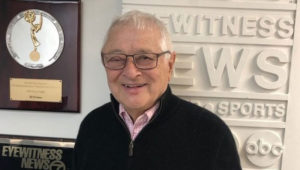Barely Keeping Up In TV’s New Golden Age
 The vast wasteland of television has been replaced by an excess of excellence that is fundamentally altering my media diet and threatening to consume my waking life in the process.
The vast wasteland of television has been replaced by an excess of excellence that is fundamentally altering my media diet and threatening to consume my waking life in the process.
Don’t Bet Against Local Broadcast TV
 Bayou City Broadcasting CEO DuJuan McCoy: “Broadcasting is a remarkably resilient business that remains an essential news and entertainment platform for America. The broadcast television industry is led by great companies that are disparate in parts but collaborative in vision. We have strong leaders, great advocates, game-changing visionaries and experienced winners who are vigorously committed to preserving and improving our business for the long haul.”
Bayou City Broadcasting CEO DuJuan McCoy: “Broadcasting is a remarkably resilient business that remains an essential news and entertainment platform for America. The broadcast television industry is led by great companies that are disparate in parts but collaborative in vision. We have strong leaders, great advocates, game-changing visionaries and experienced winners who are vigorously committed to preserving and improving our business for the long haul.”
Local TV Still No. 1 For Political Campaigns
 When considering which local medium provides the most efficient and effective advertising platform for political campaigns; let us first imagine a media world without local, over-the-air television. What local media would be left for the political pro’s to evaluate, cable … digital? Each get a lot of ink, but media professionals understand the risks of putting their media-dollar-eggs into those baskets.
When considering which local medium provides the most efficient and effective advertising platform for political campaigns; let us first imagine a media world without local, over-the-air television. What local media would be left for the political pro’s to evaluate, cable … digital? Each get a lot of ink, but media professionals understand the risks of putting their media-dollar-eggs into those baskets.
Could Comcast-TWC Go The Way Of TCI-Bell Atlantic?
Getting ‘Right’ With The FCC Chairman
 Preston Padden, executive director, Expanding Opportunities For Broadcasters Coalition: “Our beloved broadcasting industry has had a rocky time with the past two permanent Chairs of the FCC, Kevin Martin and Julius Genachowski (for sure things went better with Interim Chair, Mignon Clyburn). Now our industry has a chance for a fresh start with a new Chairman, Tom Wheeler. It is important that we get off on the right foot.”
Preston Padden, executive director, Expanding Opportunities For Broadcasters Coalition: “Our beloved broadcasting industry has had a rocky time with the past two permanent Chairs of the FCC, Kevin Martin and Julius Genachowski (for sure things went better with Interim Chair, Mignon Clyburn). Now our industry has a chance for a fresh start with a new Chairman, Tom Wheeler. It is important that we get off on the right foot.”
Digital, Social Media Issues For Broadcasters
 David Oxenford: Social media and other digital platforms are playing a more and more important part of the business of traditional media companies. TV broadcasters need to exercise care in using Internet content on their digital properties, and should know why fair use is not always a defense.
David Oxenford: Social media and other digital platforms are playing a more and more important part of the business of traditional media companies. TV broadcasters need to exercise care in using Internet content on their digital properties, and should know why fair use is not always a defense.
WNYW GM Addresses News Cliche Comments
The Argument For Better Short-Form Ads
 The 15-second TV ad is already “the new black,” but it has yet to achieve the same level of audience engagement as its 30-second and one-minute predecessors. Advertisers must now explore this new frontier further to make short-form ads more effective, regardless of the platform.
The 15-second TV ad is already “the new black,” but it has yet to achieve the same level of audience engagement as its 30-second and one-minute predecessors. Advertisers must now explore this new frontier further to make short-form ads more effective, regardless of the platform.
Why Can’t The Networks Make Good TV?
That may seem like a sweeping generalization, but we are not even halfway through the 2013-14 television season and 19 of the shows that debuted last fall have either been canceled or are knocking on death’s door. Audiences have rejected the product. Millions of dollars have gone down the drain.
State Of The Sitcom Isn’t So Bad After All
Ed Martin: “One of the big stories during the 2013-14 “traditional” broadcast season has been the uncertain future (or “death” in some circles) of the network sitcom. I have to wonder what all the hand-wringing is about.”
Congress Shouldn’t Carry Water For Pay TV
 Fred Campbell, executive director of the Center for Boundless Innovation in Technology: “Pay-TV providers want to have it both ways. They want the ability to blackout channels they don’t think they need while asking Congress to prevent broadcasters from withholding their programming when video providers refuse to pay. Enhancing the power of pay-TV providers over programming in this way might improve their bottom line, but it wouldn’t benefit consumers. Congress should just say no.”
Fred Campbell, executive director of the Center for Boundless Innovation in Technology: “Pay-TV providers want to have it both ways. They want the ability to blackout channels they don’t think they need while asking Congress to prevent broadcasters from withholding their programming when video providers refuse to pay. Enhancing the power of pay-TV providers over programming in this way might improve their bottom line, but it wouldn’t benefit consumers. Congress should just say no.”
Putting Journalism Cart Before The Ad Horse
 Michael Wolff on the flurry of new journalism startups: “These new efforts and personalities represent smidgen-size audiences that would, from a business perspective, hardly be worth commenting on, except for the fact that the people doing the commenting — other journalists — believe that perhaps, in a declining profession, this could be a new life.”
Michael Wolff on the flurry of new journalism startups: “These new efforts and personalities represent smidgen-size audiences that would, from a business perspective, hardly be worth commenting on, except for the fact that the people doing the commenting — other journalists — believe that perhaps, in a declining profession, this could be a new life.”
Local TV News: Too Dumb To Watch
 A former news viewer in Pittsburgh writes: “Once upon a time the TV news departments were considered a public service function and we had actual meaningful news. At some point along the way someone came up with the bright idea that the news could be a profit center … instead of being a public service, and things began to change. What has evolved is only a faint remnant of what TV used to be and what it still could be if some executives would realize that quality content sells soap. Instead we are bombarded with a barrage of shameless self-promotion for the sake of ratings.”
A former news viewer in Pittsburgh writes: “Once upon a time the TV news departments were considered a public service function and we had actual meaningful news. At some point along the way someone came up with the bright idea that the news could be a profit center … instead of being a public service, and things began to change. What has evolved is only a faint remnant of what TV used to be and what it still could be if some executives would realize that quality content sells soap. Instead we are bombarded with a barrage of shameless self-promotion for the sake of ratings.”
Nipplegate 10 Years Later: A Flash In The Pan
 Decency crusaders thought it would be a pop-culture 9/11. But if the Janet Jackson incident changed anything, it was the belief that one controversy could turn back the cultural clock.
Decency crusaders thought it would be a pop-culture 9/11. But if the Janet Jackson incident changed anything, it was the belief that one controversy could turn back the cultural clock.
Mark Fowler: FCC Guilty Of ‘Broadband Bias’
 The former FCC chairman writes in The Wall Street Journal: “For the past five years, the FCC has cheered wireless broadband as the future of communications. But television broadcasters have much of the spectrum that wireless companies want. So the FCC has intervened to reassign chunks of spectrum from one group to another — and its broadband bias comes at the expense of broadcasters.” WSJ subscribers can read the full story here.
The former FCC chairman writes in The Wall Street Journal: “For the past five years, the FCC has cheered wireless broadband as the future of communications. But television broadcasters have much of the spectrum that wireless companies want. So the FCC has intervened to reassign chunks of spectrum from one group to another — and its broadband bias comes at the expense of broadcasters.” WSJ subscribers can read the full story here.
TV Everywhere’s Problem? No One Wants It
 Joe Marchese, CEO of true[X] media: “I would argue that the real problem with TV Everywhere is that it’s an unwanted solution to a problem that people don’t really have. Despite what the pundits say, people don’t want a “TV” experience everywhere. Seriously, who honestly likes the user interface of their TV? Even video-on-demand leaves us wanting a better solution. Consumers take their content with them around the house — and beyond. That doesn’t mean we want to port the remote + set-top-box experience everywhere as well.”
Joe Marchese, CEO of true[X] media: “I would argue that the real problem with TV Everywhere is that it’s an unwanted solution to a problem that people don’t really have. Despite what the pundits say, people don’t want a “TV” experience everywhere. Seriously, who honestly likes the user interface of their TV? Even video-on-demand leaves us wanting a better solution. Consumers take their content with them around the house — and beyond. That doesn’t mean we want to port the remote + set-top-box experience everywhere as well.”
The Case For More Effective Short-Form Ads
 The 15-second ad is already “the new black,” but it has yet to achieve the same level of audience engagement as its 30-second and one-minute predecessors. Advertisers must now explore this new frontier further to make short-form ads more effective, regardless of the platform.
The 15-second ad is already “the new black,” but it has yet to achieve the same level of audience engagement as its 30-second and one-minute predecessors. Advertisers must now explore this new frontier further to make short-form ads more effective, regardless of the platform.
10 Important Local Marketing Trends For 2014
 The digital world that small businesses need to navigate becomes increasingly more complicated each year. But Court Cunningham, CEO of Yodle, says that new trends in store for 2014 will help simplify SMBs’ digital marketing efforts. “In 2014, I believe the complexities in local online marketing will continue to grow, but as local marketing automation systems emerge this complexity will become manageable and simplified for SMBs,” Cunningham says.
The digital world that small businesses need to navigate becomes increasingly more complicated each year. But Court Cunningham, CEO of Yodle, says that new trends in store for 2014 will help simplify SMBs’ digital marketing efforts. “In 2014, I believe the complexities in local online marketing will continue to grow, but as local marketing automation systems emerge this complexity will become manageable and simplified for SMBs,” Cunningham says.
It’s Time For A Moment Of Reflection, CCA
 In December, the Competitive Carriers Association (CCA), a trade association that represents most wireless carriers with the exception of Verizon Wireless and AT&T, filed comments at the FCC in response to the proposed rulemaking to eliminate the so-called UHF discount. The filing would be downright funny if it wasn’t so desperate, specious and irresponsible. The issue has absolutely no impact on the wireless industry. So why would CCA file? Was it a mistake?
In December, the Competitive Carriers Association (CCA), a trade association that represents most wireless carriers with the exception of Verizon Wireless and AT&T, filed comments at the FCC in response to the proposed rulemaking to eliminate the so-called UHF discount. The filing would be downright funny if it wasn’t so desperate, specious and irresponsible. The issue has absolutely no impact on the wireless industry. So why would CCA file? Was it a mistake?
Supporting The Home Team From Your Couch
 Nowadays, do sports fans have to show their support by purchasing tickets? After all, the NFL makes much more from TV than at the box office. Aren’t you doing your fair share by staying comfy warm downstairs by your own huge high-definition TV, where you’re surrounded by chosen friends and family, and have your own choice refreshments and your own toilet facilities?
Nowadays, do sports fans have to show their support by purchasing tickets? After all, the NFL makes much more from TV than at the box office. Aren’t you doing your fair share by staying comfy warm downstairs by your own huge high-definition TV, where you’re surrounded by chosen friends and family, and have your own choice refreshments and your own toilet facilities?
Bragging Remains A Drag On Local News
The Orlando Sentinel‘s Hal Boedeker: “Just when 2013 was almost over, I was reminded of one of my least favorite topics: the incessant bragging in local TV news.”
Why Hard News Is A Hard Sell For Advertisers
Digitally delivered news, both hard and soft, appears to combine reach, popularity, engagement and authority like no other collective of digital assets. And individual news outlets engage their readers and viewers frequently. The uncomfortable truth, however, is that the advertiser has not followed the user. If ever there was a misalignment of time spent and the allocation of advertiser dollars, this is it.
The Future Of Journalism Isn’t Bleak
Even as today’s major journalistic institutions struggle to adapt, media startups and investigative outlets carry the torch.
An Ex-Anchorman’s Take On ‘Anchorman 2’
 Longtime WCCO Minneapolis anchor Don Shelby: “I laughed until I cried and I hung my head in shame one recent weekend in New York. After you see the movie and laugh at the ridiculousness of television news as Ron Burgundy portrays it, go home and ask whether what passes as journalism today really is journalism. For those of us who tried to inform, it is not easy to see television journalism turned into a punchline.”
Longtime WCCO Minneapolis anchor Don Shelby: “I laughed until I cried and I hung my head in shame one recent weekend in New York. After you see the movie and laugh at the ridiculousness of television news as Ron Burgundy portrays it, go home and ask whether what passes as journalism today really is journalism. For those of us who tried to inform, it is not easy to see television journalism turned into a punchline.”
Counterpoint: The Seattle Times Got It Wrong
 The Seattle Times and its publisher, Frank Blethen, have long styled themselves as crusaders for independent journalism and freedom of the press. So, it’s both discordant and disappointing that a recent editorial in The Times called for heavy-handed federal government intervention to limit media companies’ ability to acquire and run more TV stations.
The Seattle Times and its publisher, Frank Blethen, have long styled themselves as crusaders for independent journalism and freedom of the press. So, it’s both discordant and disappointing that a recent editorial in The Times called for heavy-handed federal government intervention to limit media companies’ ability to acquire and run more TV stations.
The Best & Worst Television Shows Of 2013
 Hank Stuever of the Washington Post: “My favorite TV shows this year were dour, cruel and often violent affairs — even my favorite reality-based show was about death. What’s wrong with me? (Don’t answer that.) Here are my picks for the TV’s best offerings in 2013. And I wouldn’t be doing my job if I didn’t also include a list of letdowns, too.”
Hank Stuever of the Washington Post: “My favorite TV shows this year were dour, cruel and often violent affairs — even my favorite reality-based show was about death. What’s wrong with me? (Don’t answer that.) Here are my picks for the TV’s best offerings in 2013. And I wouldn’t be doing my job if I didn’t also include a list of letdowns, too.”
Do Too Many Options Erode News Relevance?
The emergence of the 24/7 news cycle, along with new formats and sources of news delivery, appear to have eroded news consumers’ engagement with and trust in established news media. For a time at least, it seemed that the more news that was available to news consumers, the less that news was perceived as credible.
5 Investments Local TV Needs To Make In ’14
 With 2014 just around the corner, some local TV newsrooms are still dawdling when it comes to moving into the digital era. “Many newsrooms will need measurable Web-based improvements in 2014, which will entail spending and newsroom cultural shifting,” says KSBW San Diego’s J.R. Mahon. Here are five most essential digital investments for broadcast newsrooms in the coming year.
With 2014 just around the corner, some local TV newsrooms are still dawdling when it comes to moving into the digital era. “Many newsrooms will need measurable Web-based improvements in 2014, which will entail spending and newsroom cultural shifting,” says KSBW San Diego’s J.R. Mahon. Here are five most essential digital investments for broadcast newsrooms in the coming year.
Giving Thanks For The ‘Classic TV’ Diginets
 The years when television offered so much innocent fun are long gone, but wonderful memories remain. It is in that context that I also feel thankful for the sudden abundance of retro-programming networks — all of which, I’m pleased to say, are available to me on my cable system. Amid the madness and the multitasking and the mounting daily stresses of this new millennium, there are instant diversions to be found on Me-TV, Antenna TV, This TV and Cozi TV.
The years when television offered so much innocent fun are long gone, but wonderful memories remain. It is in that context that I also feel thankful for the sudden abundance of retro-programming networks — all of which, I’m pleased to say, are available to me on my cable system. Amid the madness and the multitasking and the mounting daily stresses of this new millennium, there are instant diversions to be found on Me-TV, Antenna TV, This TV and Cozi TV.
Scripps’ TV Paywall: Dividing Industry Line?
 E.W. Scripps on Thursday shocked the broadcast TV world by announcing that it was raising a paywall for the site of its Cincinnati ABC affiliate WCPO. Michael Depp: “With this move, there is no doubt that Scripps takes its digital platform gravely seriously. What we’ll now see is if the wall it’s building in Cincinnati is more than just between paying subscribers and less-committed users.”
E.W. Scripps on Thursday shocked the broadcast TV world by announcing that it was raising a paywall for the site of its Cincinnati ABC affiliate WCPO. Michael Depp: “With this move, there is no doubt that Scripps takes its digital platform gravely seriously. What we’ll now see is if the wall it’s building in Cincinnati is more than just between paying subscribers and less-committed users.”
Should Local Businesses Prefer Local Media?
 Nearly half of all local advertising dollars are going to Internet pureplays. And while big national companies such as Google, Yahoo, Reach Local, Groupon, Autotrader and Zillow might help local businesses target customers, most of that ad money is leaving the market and doing nothing to boost the local economy. By spending with local media — companies that pay taxes and employ local residents — businesses can help flow more cash into their local markets.
Nearly half of all local advertising dollars are going to Internet pureplays. And while big national companies such as Google, Yahoo, Reach Local, Groupon, Autotrader and Zillow might help local businesses target customers, most of that ad money is leaving the market and doing nothing to boost the local economy. By spending with local media — companies that pay taxes and employ local residents — businesses can help flow more cash into their local markets.
A Pause To Reflect On The State Of 4K TV

Do Local News Anchors Think We’re Idiots?
 Whose idea was it to have news anchors explain what we just saw or to confer congratulations on reporters? There are now so many reasons to avoid watching local news — network promos posed as news, bogus “breaking news” and frenzy-whipped weather forecasts that call for winter weather in January — why degrade the legitimate stuff while further degrading your audiences?
Whose idea was it to have news anchors explain what we just saw or to confer congratulations on reporters? There are now so many reasons to avoid watching local news — network promos posed as news, bogus “breaking news” and frenzy-whipped weather forecasts that call for winter weather in January — why degrade the legitimate stuff while further degrading your audiences?
Taking A Narrow View Of The UHF Discount
Like the story of the blind men and the elephant, the FCC’s proposal to eliminate the UHF discount thrusts out its hand, touching only one aspect of the FCC’s ownership rules, and risks discovering later that there is much more to the elephant than its tail.
It’s Time To Reinvent The News App
 Local news apps are in trouble. Large Internet companies are making direct plays for local news audiences, who tend to consume only a small slice of content via mobile. “The implications for local media,” says StepLeader’s Matthew Davis, “The delivery and presentation of news into the app environment is ready for an overhaul.”
Local news apps are in trouble. Large Internet companies are making direct plays for local news audiences, who tend to consume only a small slice of content via mobile. “The implications for local media,” says StepLeader’s Matthew Davis, “The delivery and presentation of news into the app environment is ready for an overhaul.”
Mobile News Needs Technology Overhaul
 Mobile is unlike anything media companies have seen before, not just because of the new opportunities that portability brings, but because it levels the playing field between consumer and media professional. Because their is no “audience” for mobile Web, only participants, media companies need to devise a new approach. Terry Heaton: “Mobile news demands its own model, because mobile is its own form of media. It’s not an extension of the way we currently do things; it’s entirely new, because the consumers of news have exactly the same gear we in media have, and that creates a paradigm never seen before in the history of newsgathering or news making.”
Mobile is unlike anything media companies have seen before, not just because of the new opportunities that portability brings, but because it levels the playing field between consumer and media professional. Because their is no “audience” for mobile Web, only participants, media companies need to devise a new approach. Terry Heaton: “Mobile news demands its own model, because mobile is its own form of media. It’s not an extension of the way we currently do things; it’s entirely new, because the consumers of news have exactly the same gear we in media have, and that creates a paradigm never seen before in the history of newsgathering or news making.”
TV Violence Pushes Vulnerable To Brink
 What TV now does far better than ever before is push the vulnerable closer to or beyond their brink. It’s difficult to afflict the well-adjusted, to have them do a 180. Maybe the repetitive, antisocial messages that all forms of entertainment have become reliant upon can move them a few degrees off, but nothing that would have them storm a campus with an AK47. But if the vulnerable are moved even one or two degrees toward or off their brink, if the messages become a prompt…. TV’s always there to give the vulnerable that extra little push, the kind that makes all of us vulnerable.
What TV now does far better than ever before is push the vulnerable closer to or beyond their brink. It’s difficult to afflict the well-adjusted, to have them do a 180. Maybe the repetitive, antisocial messages that all forms of entertainment have become reliant upon can move them a few degrees off, but nothing that would have them storm a campus with an AK47. But if the vulnerable are moved even one or two degrees toward or off their brink, if the messages become a prompt…. TV’s always there to give the vulnerable that extra little push, the kind that makes all of us vulnerable.
Drunk Driving Hits A Broadcast Roadblock
 Since its inception 10 years ago, over half of all Americans recognize the anti-drunk driving PSAs of Project Roadblock. More importantly, awareness among the intended men 21-35 target demo is at 60%. Project Roadblock’s success is possible because of the concern and cooperation of our nation’s broadcast television stations — more than 1,300 primary and D2 stations participated in Project Roadblock 2012.
Since its inception 10 years ago, over half of all Americans recognize the anti-drunk driving PSAs of Project Roadblock. More importantly, awareness among the intended men 21-35 target demo is at 60%. Project Roadblock’s success is possible because of the concern and cooperation of our nation’s broadcast television stations — more than 1,300 primary and D2 stations participated in Project Roadblock 2012.
The Media Must Rethink Its Infrastructure
 The Web has made media’s simple business model — making content and selling advertising — very complex. Now, technology has made it possible for audiences to consume media content at their will, undermining the value of mass marketing. “In the network, it’s just not natural for the individual infrastructures of individual media companies to exist as they do offline. The net would rather go from author to reader directly, and that is something media companies just cannot abide,” Terry Heaton says.
The Web has made media’s simple business model — making content and selling advertising — very complex. Now, technology has made it possible for audiences to consume media content at their will, undermining the value of mass marketing. “In the network, it’s just not natural for the individual infrastructures of individual media companies to exist as they do offline. The net would rather go from author to reader directly, and that is something media companies just cannot abide,” Terry Heaton says.
Put Local Digital Back In Local Hands
 Local media companies need to decentralize their digital ad efforts and put the control and technology in the hands of their local people, rather than rely on the “Industrial Age” practice of centralization, says Terry Heaton. “Centralized command-and-control groups amount to third-party ad networks, and what’s good for the network isn’t necessarily good for the local property. It doesn’t matter if such a structure is considered ‘best practices’ within the industry; it’s headed down a very long highway to inadequacy,” he says.
Local media companies need to decentralize their digital ad efforts and put the control and technology in the hands of their local people, rather than rely on the “Industrial Age” practice of centralization, says Terry Heaton. “Centralized command-and-control groups amount to third-party ad networks, and what’s good for the network isn’t necessarily good for the local property. It doesn’t matter if such a structure is considered ‘best practices’ within the industry; it’s headed down a very long highway to inadequacy,” he says.


































